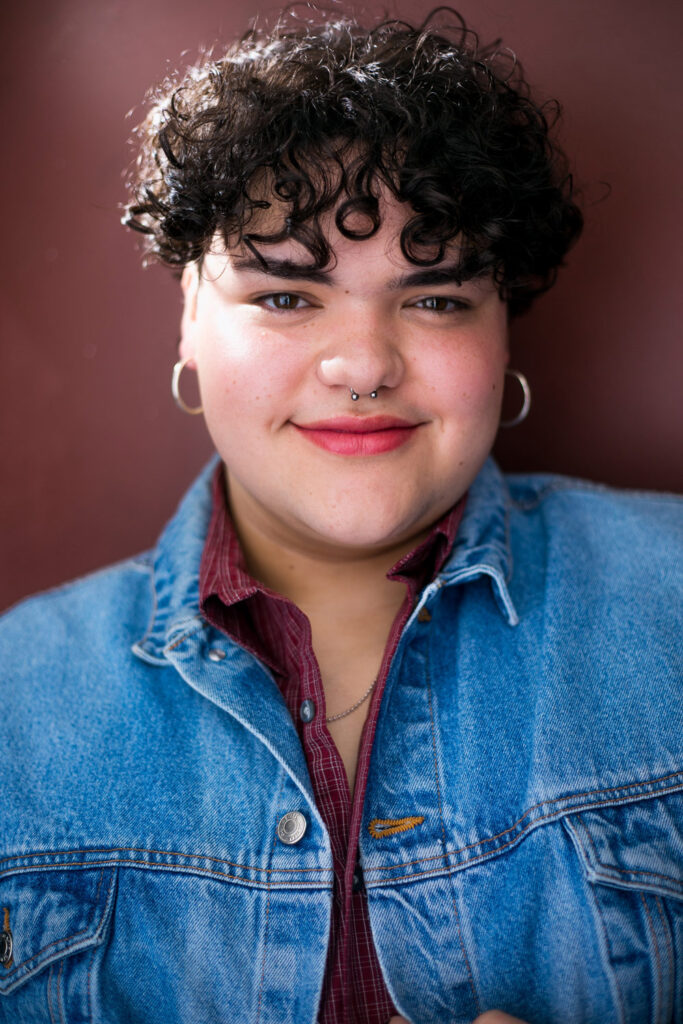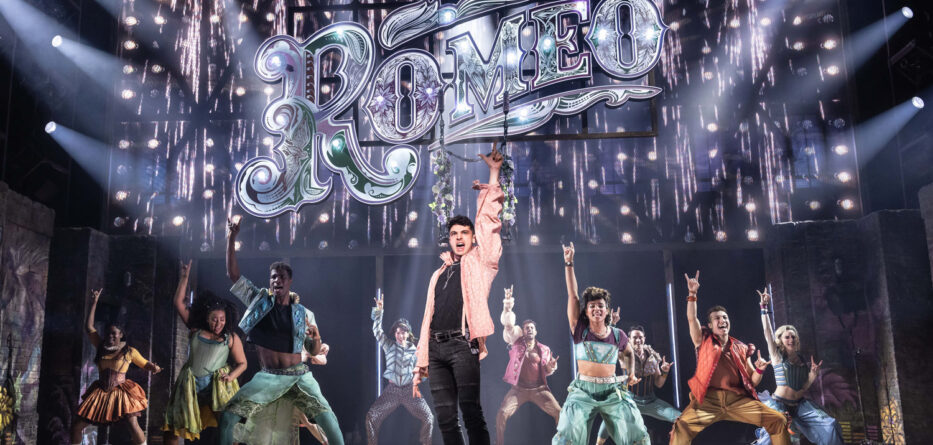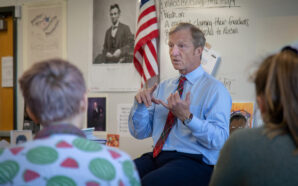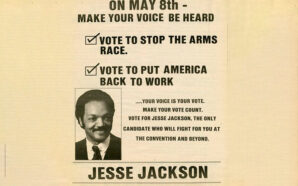Arturo Hilario
El Observador
One of the most compelling and fun new Broadway musicals has arrived to the Bay Area, bringing with it a jukebox of pop hits and a story that turns a tragic romance into an opportunity for reinvention and joy.
& Juliet is a modern update to Shakespeare’s teenage tragedy Romeo and Juliet, which allows the story of the ill-fated lovers to continue, striking out the death part and letting Juliet continue a search for her meaning, and letting Romeo have a more positive journey as well.
Using pop music to tell the tale woven with themes of independence, the joys of friendship and self-love, the show’s musical acts use songs exclusively written by Swedish producer and songwriter Max Martin.
Martin’s pen has been responsible for some of the most infectious and beloved pop songs of both the 20th and 21st century, and those unfamiliar with him might be surprised by his extensive catalogue of chart-topping hits.
Some of the songs featured in & Juliet include: “Larger than Life”, “Everybody (Backstreet’s Back)” and “I Want It That Way” by the Backstreet Boys, “Oops!…I Did It Again”, “I’m Not a Girl, Not Yet a Woman” and “…Baby One More Time” by Britney Spears, “Can’t Feel My Face” by The Weeknd, “Teenage Dream” and “Roar” by Katy Perry, and “Break Free” and “Problem” by Ariana Grande.
Alongside the music, the actors in the show have been praised for their interpretations of the musical hits, with infectious choreography and endearing performances from a diverse cast that portrays the title character of Juliet, her ex-lover Romeo, William Shakespeare, his wife Anne Hathaway (her actual name), and one new compelling character that is original to this show, May.
May is Juliet’s best friend and a nonbinary character which was first played on Broadway by nonbinary actor Justin David Sullivan, their performance received a lot of praise as their story is a highlight of the show for the positive portrayal of gender fluidity and the way their journey is woven into the main story of & Juliet.
Following in the footsteps of nonbinary representation in the show is the gender non-conforming multi-disciplined actor and creator Ishmael Gonzalez (using pronouns they/them/he), who I recently had the opportunity to speak to about their experience on the show.
From Miami-Dade Florida, he is of Cuban descent and from a family of artist and performers, making this opportunity to perform on stage a proud moment for their family. Playing the character of Gregory and at times taking up the mantle of May as an understudy of the character, Gonzalez took a moment to reflect on their journey into the arts and support from his family, what it means to be a Latino actor in the current turbulent political times that affect Latino communities around the country, how creativity and joy are antidotes to political poison, and why & Juliet is an adventurous and entertaining show that works as a form of escapism and hope for anyone.
& Juliet is now playing at San Francisco’s Orpheum theatre until July 27, 2025. It will return to the Bay Area at San Jose’s Center for the Performing Arts October 7-12, 2025.

Ishmael Gonzalez is a Cuban-American nonbinary actor with the North American tour of & Juliet, a new take on William Shakespeare’s Romeo and Juliet. It is currently playing at San Francisco’s Orpheum Theatre from now until July 27, 2025. Photo Credit: Ishmael Gonzalez / & Juliet
Ishmael, could you talk about your background and what inspired you to pursue a career in the performing arts?
So my family, we’re all artists, which is really interesting for a family that is a product of immigration. And it’s really amazing. My family is mostly dancers. So my brother and my cousin and my mom were all dancers when they were younger, and some of them are still dancers. And my brother started doing theater when he was in middle school, and I would go watch his shows. And through seeing him on stage, I saw myself in him, and I really wanted to start doing that.
So then I joined the drama class when I was in middle school at the same school that we were at, and I started doing shows there. And then then I started to take it a little more seriously. I went to an arts high school in Miami called New World School of the Arts. And there, I really started to refine and just become more well-versed in theater-making and being a performer. And then I went to college for acting at University of North Carolina School of the Arts and I actually did an acting degree there instead of musical theater. But we still did a lot of musical theater things there.
Yeah, that’s pretty much the trajectory of it. It really started as kids, we were always performers, we would always be doing shows. I would always do these Christmas shows in my room with lights, and I would be sitting, I would be hiding underneath my bed with a power strip, plugged in with a bunch of Christmas lights, and I would unplug them and plug them, which was probably very dangerous. But I would unplug and plug them to make this light show in my room. And creating as a child, we would make dresses out of blankets and there was always that creative spark in our family, and we always found a way to make something happen with the few little resources that we had, and so it’s translated into how I perform and work today.
Now you are working on an acclaimed Broadway show, how’s that transition been for you from those bedroom performances to a professional stage? And what has that experience been so far?
It’s been a whirlwind. It’s so crazy to go from doing shows at school for a week or two to doing eight shows a week. I mean, this is my first professional gig that I’ve gotten since I left school. So I didn’t do any regional theater or anything. So I really didn’t have time to practice what doing eight shows a week was until I started doing this show. And it really took me by surprise.
But it also was a great learning lesson in preservation of the voice of the body and really learning how to be consistent. I think that’s the biggest thing that I’ve learned through this process, and I think is the key to having a long career in this industry, is consistency. And being able to give 100% or know what You can give that day, even if you’re feeling a little bit under, but understanding that I have to be present every day in the performance. And I think that’s been the biggest transition in my brain, is understanding my body. I’ve never been so self-aware of my body and what I put into my body, how I exercise, what my maintenance is like outside of the show.
The show off-stage is as important as the show on stage. And I think sometimes when I’m lacking in some areas, off-stage is when I start to notice that my performance is not giving what I need to give. It’s also just a business. And sometimes, those are the harder parts of being in this industry is learning that this is a business, and we are essentially a product, but we’re a very cool product. We’re a very fancy artistic product. And it’s about finding that balance of understanding the business of theater and still remaining as an artist and as a creative, because at the end of the day, that is our selling point, is our creativity, is our artistry.
And so I always also try to make sure that I’m treating myself artistically outside of work as well, to keep how I am performing in work in balance, too. Because sometimes it’s hard dancing eight times a week, you’re putting your body through incredible stress. So it’s very important to also have things outside of work that feed me as well as a human being so that I can continue to enjoy the work that I do on stage.
What do you do outside of the work part of this that keeps you artistic muscle going?
I have a different hobbies and different projects that I try to keep up with. I love to knit and I love to crochet, and that’s something that seems so dumb, but it really is another form of artistry for me to express myself is creating. And I create gifts for my cast all the time. When we opened, I made these little hearts with headphones, which is our logo, and I made these crochet hearts with headphones for everybody in the cast when we opened.
That’s just a small token of my appreciation, but also my time. That’s the way that I keep myself artistically alive. And I’m also a theater maker myself. I devise and create shows myself. Specifically, a lot of the work that I create outside of & Juliet is centered around, first and foremost, my Latino heritage and my community and my family, and really dissecting the experience of what it is to be myself in this world. And I’ve realized that a lot of times, creating your own work is a self-validation, and it’s the only way in some ways that you reaffirm your reality of what you see around you.
And especially on tour, because our environment is constantly changing, it’s really hard to maintain a sense of self. So I think it’s really important for myself to create those things outside of work so that I can continually remind myself of who I am and remind myself of the work that I love to do and just remind myself how fierce I am.
Like you mentioned, Broadway is a business, but it’s also artistry. One thing that Broadway attempts to do is constantly change and evolve, progress and highlight communities that may not be as protected in society. What that means to you being part of this show and also being a Latino with immigrant roots in your family and seeing the immigration issue currently playing out in the country?
I mean, right now, it’s really hard being a US citizen, I’m not going to lie, and being in this country and seeing how much my community is hurting right now, especially when I’m in this show, sometimes it feels frivolous to be in something like this. And then I remind myself, especially when I see people from the Latino community come to the show, it makes me emotional.
I’ve met people at the stage door, and I talk to them in Spanish, and it’s the first time I’ve talked in Spanish in months with these audience members. And it makes me really emotional because it reminds me that the story is for everybody. It sounds so corny, and a lot of people say this, but where I come from, people don’t do this kind of stuff.
Seeing the Latino community in the audience is what fuels me. Every time I see somebody in the first few rows and I can tell that they’re Latino, it gives me more of an engine to perform at a higher caliber because I want to be that excellent for them so that they can see themselves reflected the same way that I saw myself reflected.
-Ishmael Gonzalez
We don’t have these opportunities to go to the country and be performers. And so I feel very lucky to be from my lineage and also be able to carry this tradition of being a performer, because my family are all performers at different levels. And in some ways, this is the biggest scale that any of my family members have ever reached.
And so it’s a beautiful experience, but it’s also a very hard experience. There’s a cognitive dissonance that I feel a lot of the times because I feel so fortunate for the job that I have right now and then I see how much the Latino community is hurting right now and so much of the fear that is being created around my community.
And in a lot of ways, what’s so beautiful about being in the show is that I’m a representation of the antithesis of all those fears that people create about my community. And it’s really powerful to be standing on stage every night and looking out into the audience and especially when we get to more popular cities like San Francisco, Los Angeles, Chicago. Seeing the Latino community in the audience is what fuels me. Every time I see somebody in the first few rows and I can tell that they’re Latino, it gives me more of an engine to perform at a higher caliber because I want to be that excellent for them so that they can see themselves reflected the same way that I saw myself reflected in my brother on the middle school stage. It’s like a bigger version of that now.
So despite the circumstances that are in this country currently, it’s a nice respite to look for the joy in things as well.
Well, I think something that’s important, too, that I’ve learned is that joy is resistance as much as resistance is resistance. And I think there’s so many times that we’re made to feel small. Honestly, when I’m touring the country and I’m working and I’m staying in these hotels, and I see the workers here, and almost all of them are Latino.
I always try to connect with them because I try to remind myself that my community is beyond the show, and there’s so many people around me in this country that are affected by what’s happening. And I think it’s so important to make people feel seen. I’m so lucky and fortunate that I grew up speaking Spanish and I’m able to communicate in that way with strangers. But I think it’s always a gift to see someone and communicate with them in their language because it’s a reaffirmation that this is a place for them, too.
I’m the only Spanish-speaking company member in the show. And so that’s why I feel so honored to be able to have the interviews with these publications, because for me, it’s really important that we get the Latino community to the shows because they deserve to see the show and they deserve to have a bit of joy in their life because we face so much sadness every day.
And I feel like it’s really important for them to also experience this joy. And I don’t know, there’s a lot of times in some states where it’s a lot of white people in the audience. And as a theater creator myself, as someone who wants to create my own theater company and outreach to my community, I think it’s even more important to create accessibility for the Latino community to come see the shows. Because a lot of times, our tickets are very expensive, and so I think it’s really important to also create programs that help subsidize tickets for people who aren’t able to always come to the theater and have a good time.
Can you talk about your roles as Gregory and understudying as May?
So pretty much every night I’m on-stage playing Gregory, we call it the player track. And so the players make up the ensemble that supports the story throughout. And so we are Shakespeare’s players, we are Shakespeare’s actors, and we are building the show every single night from the beginning. I mean, the beginning of the show is us setting the stage for the night of the play. Because in this rendition of the show, we’re basically performing Romeo and Juliet for the first time. And so we’re creating this world that everyone lives in. And then also there’s principal characters that are new, that we know of. And one of them that is new is May, who is Juliet’s best friend.
And this is one of the first characters in a musical that I’ve ever seen that is nonbinary or gender non-conforming. And especially as a gender non-conforming actor, it’s so special to have the opportunity to play this part when I can.
Because I’m an understudy, I’m not on as May all the time. But when I get the opportunity to do it, in my bio in the program, I have a little dedication to my grandparents who have passed away, and every single time that I go on for May, I always pray to them before I go on because they’re the reason that I’m here. Their sacrifices that they made are what allowed me to be in this moment. And so I always have to honor them before I go on stage to play that character.
[May] is someone who allows Juliet to see her power and her beauty, and also May has an opportunity to also find love for themselves, too. And I think that’s something that’s to be important in the theater and in life in general, to see stories that allow us to have love and experience love.
And I’m very excited to see where the theater goes from here in terms of representation for nonbinary people, because even going to the stage door after the show and talking to parents of nonbinary and trans kids and having them cry in my arms when I play May, it’s so special. And sometimes I can’t believe that it’s happening because it’s surreal. But it’s so beautiful to see how this representation of this person means so much to so many people that don’t even identify in that gender expression.
Because I think also, too, nonbinary people represent freedom, and they represent seeing beyond this binary world that we live in. And I feel like a lot of people are yearning for that freedom within themselves. And it may not be that they express themselves as gender fluid or whatnot, but there is a freedom in expression that non-binary people have that I feel like a lot of people are scared of. And that’s when we have these anti-trans bills that are being passed.
And I think it’s interesting when I’m performing as May, you never know what’s going to happen. Sometimes people walk out in the middle of the songs that I sing. Sometimes people are overjoyed, and I see them crying in the front row when I sing, “I’m Not a Girl, Not Yet a Woman” but it’s always a toss-up.
You never know what it’s going to be like. And sometimes it varies by city. Sometimes we have great reactions to May, and sometimes we don’t. But something I’ve learned through being able to inhabit this character is it’s important to do it regardless because people’s discomfort is the moment when they also learn, and they also learn to see something different.
And sometimes we have to get past that discomfort to learn about a different experience that isn’t ours. I think that is really what’s so important about having this character in the show.
What has been the most memorable experience or memory from being on this tour so far and being involved in a production like this?
I think some of the most memorable moments are the moments in which we have so much turmoil happening in this country, and we’re still doing this show despite all of the fear that’s happening. And I remember even performing on election day. It was a very hard day to go to work and feel motivated when we got the results that we got. But it reminded me that my existence is so important, and my existence is so valid. And this administration, I don’t mean to get very political with this conversation, but I just feel like that’s just the natural progression.
But this administration is poison to this country, in my opinion. And it’s beautiful to see that we are the antidote, we are the medicine for what we need right now in this country. This show, sometimes people come in and they’re like, “Oh, it’s just a jukebox musical. It’s these stupid songs.” But truly, being part of it reminds me that there’s so much power in this music.
For me, personally, I really did not like pop music that much before I started this show. Through doing this show, I really have learned that pop music has a lot of power because there’s such a joyous tempo and there’s such a rhythm to it, and you don’t really realize how powerful the lyrics actually are. Because sometimes when you really break down the songs and you look at the lyrics individually, you really start to see that there is a heart. There’s such a heart to this music. And really, that’s accredited to Max Martin, who wrote the music of the show.
I think the show was crafted in such a way that they really found songs that speak to the heart and speak to the humanity of these characters. And I think that is why this show was one of the most successful jukebox musicals, it’s because they really took time to find the songs that really helped move the story along but also tap into who we are as human beings.
It’s funny, the third song of the first song that’s song by Juliet is “…Baby One More Time” and it’s so interesting. I sit on almost like the apron of the stage every night, so I’m really close to the audience, and I can hear them. And it’s so funny when the first few chords of the song start, people can tell that it’s that song, and they start to laugh, even though it’s a very serious moment.
They start to laugh because either they’re uncomfortable or they’re either like, “Oh, it’s Britney Spears!” And she’s sitting next to a tomb, and it’s kind of funny. I feel like that song is a synthesis of the whole show in the sense of you come in, you hear this song, you’re like, “Oh, it’s kind of a joke.”
But then you really see the story of what’s happening to Juliet in that moment. And you start by laughing at it, but then you really listen, and you see, also, the girl in our show who plays Juliet, Rachel Simone Webb, she is just a supernova of talent, and she is one of the best performers that I’ve ever seen in my career of being in the theater.
Seeing her sing that song every night with so much emotion and so much vulnerability reminds me that is the power of this show, you come in expecting one thing and you leave with something completely different. And there’s so many times at the stage door that people come in and they’re like, I thought this was just going to be some kind of dumb, brainless, fun show, but I really felt something.
Even for me, I still get emotional some nights, sitting right in front of Juliet at her feet as she sings “Roar”, because I start to really feel what those lyrics are saying. I really start to hear what she’s proclaiming for herself. And that’s why so many people in the audience are moved by that song and that performance of the song because the lyrics are so real, and it speaks to everyone. And I think that really is the power of the show.
And to end the interview, why would you recommend people see & Juliet?
I think & Juliet has done a lot for the cities that we visited. And I think, for me personally, San Francisco, I went to San Francisco years ago, and I experienced how beautiful San Francisco is as a city. And I’m so excited to be back and find more community than I did the last time. And I think specifically for the queer community in San Francisco, I think this show is a really beautiful representation.
And even for people who don’t identify within the queer community, there really is a storyline and a love story for everyone in the show. And I think it truly brings people so much joy and a level of escapism that in some ways is needed right now because of how dark the times are right now. I think in a lot of ways, it is escapism, but it also is a possibility of a world that can come in the future. And we can see how much love and joy we can give each other. Every time I see people leave the theater, I only see smiles on their faces. And I think right now we need a lot of joy.
And there’s so much beautiful representation in this cast for the Black community, for the queer community, for the Latino community. I think San Francisco is such a beautiful melting pot of so many communities, and to see ourselves on that stage and see us living in joy is so important right now.





